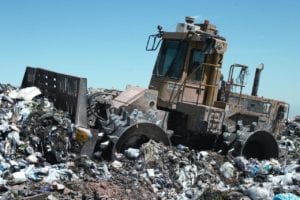Twenty-three cities have pledged to cut waste sent to landfill and incineration by 50%. This will avoid disposal of at least 87 million tons of waste by 2030 on a path towards zero waste.
By signing C40’s Advancing Towards Zero Waste Declaration, these cities have pledged to cut the amount of waste generated by each citizen 15% by 2030, reduce the amount of waste sent to landfills and incineration by 50% and increase the diversion rate to 70% by 2030. Signatory cities and regions include Auckland, Catalonia, Copenhagen, Dubai, London, Milan, Montreal, Navarra, New York City, Newburyport, Paris, Philadelphia, Portland, Rotterdam, San Francisco, San Jose, Santa Monica, Sydney, Tel Aviv, Tokyo, Toronto, Vancouver and Washington D.C. This commitment, made ahead of the Global Climate Action Summit in San Francisco, is a step towards in delivering on the highest goals of the Paris Agreement and keeping global temperature rise below 1.5℃.A zero-waste future
Worldwide waste generation is increasing faster than any other environmental pollutant, and action in this sector can have a much faster and greater impact in combating climate change.For instance, the 1.3 billion tonnes of annual worldwide food scraps sent to landfills each year decomposes into methane, which is a much more potent greenhouse gas than CO2 and already accounts for 25% of current global warming. Transforming solid waste and material management systems globally could reduce global emissions by 20%.
That is why mayors of the world’s urban centres are accelerating the transition towards a zero-waste future. Mayors have committed to taking ambitious, measurable and inclusive actions to reduce municipal solid waste generation and improve materials management in their cities.Bold commitments
The Advancing Towards Zero Waste Declaration is built on two bold commitments: 1) reducing the municipal solid waste generation per capita by at least 15% by 2030 compared to 2015; and 2) reducing the amount of municipal solid waste disposed to landfill and incineration by at least 50% by 2030 compared to 2015, and increasing the diversion rate away from landfill and incineration to at least 70% by 2030. Specifically, signatory cities will implement actions including:
- Reduce food losses and wasting of food at the retail and consumer levels by decreasing losses along production and supply chains, minimising the production of surplus food, and facilitating safe food donation and by-products for feed production.
- Implement source separated collection for food scraps and other organics and treatment infrastructure that recovers nutrients, energy and contributes to the restoration of carbon storage capacity in soils.
- Support the implementation of local and regional policies, such as extended producer responsibility and sustainable procurement, to reduce or ban single-use and non-recyclable plastics and other materials, while also improving goods reparability and recyclability.
- Increase reduction, reuse, recovery and recycling of construction and demolition materials.
- Increase accessibility, awareness, scale and inclusivity of reduction, reutilisation and recycling programmes and policies for all communities and neighbourhoods, investing in city wide communication and engagement efforts, offering resources in multiple languages, and
- Ensure benefits are distributed equitably across the city population.
- Publicly report every two years on the progress the cities are making towards these goals.






